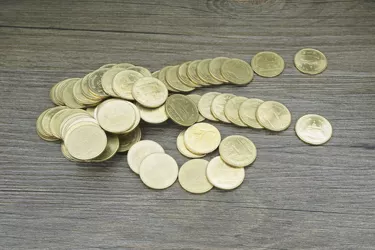
Comex is a highly organized exchange for the buying and selling of futures contracts and options for metals, including gold. The gold-oriented futures contracts and options are concerned with the price of gold at certain points in the future, for delivery in the future. By contrast, the spot market price for gold (or any other commodity) reflects what buyers and sellers are willing to trade gold for in the present, for immediate delivery.
Comex
Video of the Day
Comex, part of the CME Group, specializes in gold, silver and copper futures contracts and options. Investors do not buy gold immediately through Comex. Instead, they buy and sell financial instruments that depend on the future price of gold. In financial circles, these contracts are called derivatives, because their value is derived from the price fluctuations of commodity, not the commodity itself. The prices quoted for both futures contracts and options are not the current price of the commodity.
Video of the Day
Futures Contracts
A gold futures contract traded on Comex is an agreement to receive or deliver (buy or sell) a certain amount of gold at an agreed-upon price at an agreed-upon point in the future. The price specified in the futures contract is set when the contract is made, not when the commodity is delivered or the futures contract is otherwise settled. The futures contract price might or might be close to the current price of the commodity, but it is not going to be the same, since a futures contract tries to anticipate the up or down movement of the price.
Futures Contract Example
In an example gold futures contract, Investor A might agree to buy 100 troy ounces (1 troy ounce = 31.1 grams) of gold from Investor B for delivery three months later at x dollars per ounce. If, in three months' time, gold is worth more than x, Investor A can still buy it for x, thus realizing a profit because he is getting the metal at a discount. Investor B loses in that case because he has to sell low. But if the gold is worth less than x in three months' time, Investor B is the winner because investor A must still buy it at the higher-than-market price. (In the real world of futures contracts, A and B would probably settle with a cash payment, rather than actually exchanging metal, but the principle is the same.)
Options
Gold options, which are also traded on Comex, are similar to gold futures contracts, with one critical difference. Holding a gold option, or any option, gives the holder the right to buy a specific amount of gold at a specific price before the end of a certain amount of time, but it does not oblige the holder to do so. Like the price of a futures contract, however, an option price is established at the time the option is traded on the exchange, and is not typically the same as the spot price.
Spot Price
The spot price of gold is a fluctuating price of the metal in U.S. dollars, by the troy ounce. It is different from a Comex price in that it is for the immediate delivery of gold, not a future delivery. The spot price is a function of demand for gold versus the supply available. The higher the demand, the higher the price goes, unless there is an unexpected increase in worldwide supply.